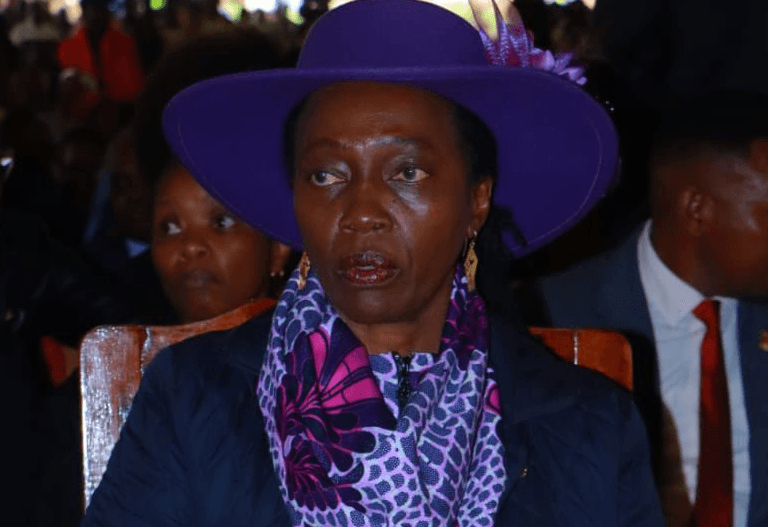We're loading the full news article for you. This includes the article content, images, author information, and related articles.
The death of Erick Kiptanui Koros, a 40-year-old boda boda rider, in Solai Police Post has drawn sharp criticism from Martha Karua and reignited concerns over police accountability and the rising number of deaths in custody across Kenya.

People's Liberation Party (PLP) leader Martha Karua has strongly condemned the death of Erick Kiptanui Koros, a 40-year-old boda boda rider, who died on Tuesday, October 7, 2025, while in custody at Solai Police Post in Nakuru County. Koros had been detained over an alleged Ksh8,000 debt.
The incident has sparked outrage and calls for justice, highlighting persistent concerns about police brutality and accountability in Kenya. Karua, a vocal critic of police excesses, questioned the circumstances surrounding Koros's death, which police have attributed to suicide by hanging using a duvet strap.
Deaths in police custody remain a significant human rights issue in Kenya. The Independent Policing Oversight Authority (IPOA) reported 20 deaths in police custody within a four-month period leading up to June 2025. These incidents often involve allegations of torture or suspicious circumstances, with families frequently disputing official police narratives.
Opposition figures, including Martha Karua, have consistently called for an end to extrajudicial killings and police brutality. In June 2025, Karua condemned the killing of a man during demonstrations in Nairobi, terming it an “extrajudicial execution.” She has also criticised the government's approach to compensating victims of police brutality, arguing that genuine compensation should be handled by the Kenya National Human Rights Commission rather than ad-hoc panels.
The Kenyan Constitution provides robust protections for individuals under arrest or detention. Article 49 outlines the rights of arrested persons, including the right to be informed of the reason for arrest, the right to remain silent, and the right to legal representation. Article 51 further stipulates that detained persons retain all fundamental rights and freedoms, except those incompatible with their detention, and are entitled to humane treatment.
Despite these constitutional safeguards, the implementation and enforcement of these rights have been a recurring challenge. Human rights organisations frequently report violations, including illegal detentions and alleged torture.
According to relatives, Erick Kiptanui Koros was arrested on Tuesday, October 7, 2025, following a dispute with a business partner over an Ksh8,000 debt. His wife was later called to Solai Police Post, where she was informed that Koros had allegedly hanged himself. The family has expressed doubts about the police's account, stating that Koros was in good health and not distressed when he left home.
Rongai Sub-County Criminal Investigations Officer Donatta Atieno stated that Koros was booked at the station around 3:30 PM EAT and found dead in his cell approximately 30 minutes later. Atieno confirmed that the matter is under investigation and will be forwarded to the Independent Policing Oversight Authority (IPOA).
The continued occurrence of deaths in police custody erodes public trust in law enforcement and the justice system. It also poses significant risks to human rights and the rule of law in Kenya. Without transparent and impartial investigations, and accountability for those responsible, such incidents can fuel public unrest and undermine efforts to reform the police service. The Independent Policing Oversight Authority (IPOA) plays a crucial role in investigating such cases, but its effectiveness hinges on cooperation from the National Police Service and the swift prosecution of culpable officers.
The primary controversy surrounds the cause of Erick Kiptanui Koros's death. The family's assertion that he was not in distress contradicts the police's suicide narrative. The short timeframe between his booking and the discovery of his body also raises questions about the circumstances within the police cell. Further details regarding the initial arrest, including whether due process was followed, remain unclear. The specific nature of the Ksh8,000 debt and the role of the area chief in the arrest also warrant further investigation.
The public will be keenly watching for the results of the IPOA investigation into Koros's death. Transparency in the investigation, including the release of autopsy reports and any CCTV footage from the police post, will be critical in addressing public concerns. The actions taken against any officers found culpable will also be a key indicator of the government's commitment to police accountability. Furthermore, the broader trend of deaths in police custody and the effectiveness of institutional reforms aimed at preventing such incidents will remain a focal point for human rights advocates.
Keep the conversation in one place—threads here stay linked to the story and in the forums.
Sign in to start a discussion
Start a conversation about this story and keep it linked here.
Other hot threads
E-sports and Gaming Community in Kenya
Active 9 months ago
The Role of Technology in Modern Agriculture (AgriTech)
Active 9 months ago
Popular Recreational Activities Across Counties
Active 9 months ago
Investing in Youth Sports Development Programs
Active 9 months ago
Key figures and persons of interest featured in this article